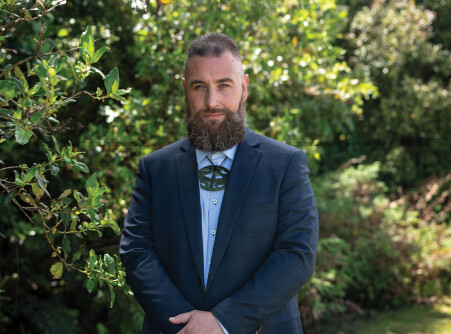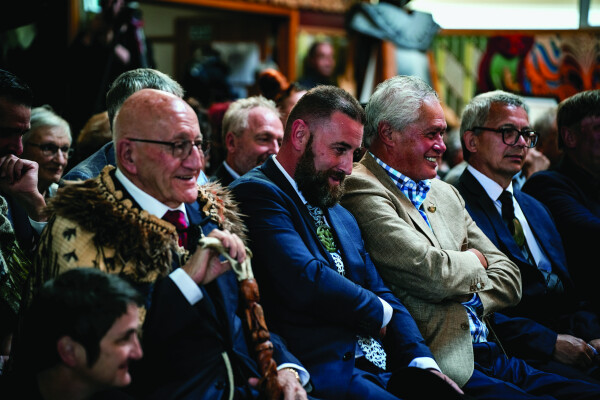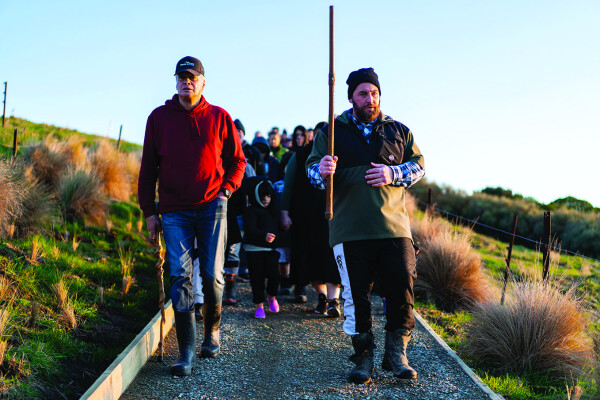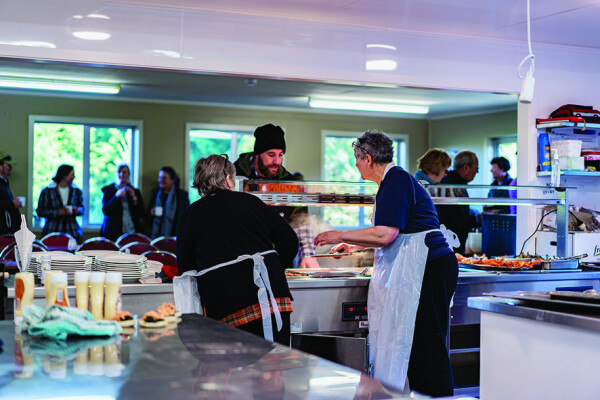A New Generation of Leadership
Mar 20, 2024

Throughout the latter half of 2023, candidates for the new Kaiwhakahaere of Te Rūnanga o Ngāi Tahu travelled throughout the motu, introducing themselves to whānau and seeking support for their nomination. In November, Te Rūnanga representatives came together to vote on behalf of each of the 18 Papatipu Rūnaka; Moeraki Representative, Justin Tipa, was the successful candidate. Kaituhi Anna Brankin sits down with Justin to discuss what motivated him to put his name forward for the role, and the aspirations he has for Kāi Tahu whānui.
 When our former Kaiwhakahaere, Lisa Tumahai, announced that she would not be standing for re-election, Justin Tipa was only two years into his first term at the table as the representative for Te Rūnanga o Moeraki. He said early on he had no intention of putting his hand up to take her place.
When our former Kaiwhakahaere, Lisa Tumahai, announced that she would not be standing for re-election, Justin Tipa was only two years into his first term at the table as the representative for Te Rūnanga o Moeraki. He said early on he had no intention of putting his hand up to take her place.
“I didn’t come to the table seeking the role, and it certainly wasn’t part of my thinking at that early stage,” he says. “However, when Lisa made it known that she was standing down there were a few people who approached me to consider standing, and a couple of taua at home who made it very clear they expected me to contest the role.”
The support of his colleagues and Papatipu Rūnaka gave Justin the confidence to accept the nomination. “I realised that while I might be new to the table, I’m not new to the tribe. I’ve been heavily involved with the iwi for nearly two decades, including five years as a staff member at Te Rūnanga o Ngāi Tahu, and five years as chair of Te Rūnanga o Moeraki,” he explains.
However, before committing to the decision Justin knew that he needed to get the ‘okay’ from the people who matter most – his partner Ana and their tamariki Tyson (27), Kauri (19), Hoani (18) and Joseph (10). “I’m very lucky to have Ana, who is my rock, and the boys who keep things locked down for me at home, and who are themselves so heavily involved with the marae and all that goes on at the pā,” he says. “Their first response was to challenge my thinking and make sure that I was doing it for the right reasons. Once they were confident in that, they were absolutely supportive.”
Once the decision had been made, Justin hit the road to introduce himself to whānau Kāi Tahu as a candidate. “I loved the campaign,” he said. “I’m really proud that we were able to conduct it largely upon our marae, where whānau could ask us questions and hear directly from those contesting the roles. It was intense at times but it was something I thoroughly enjoyed.”

Waitangi Day 2024 at Te Rau Aroha Marae.
This focus on meaningful engagement and upholding tikanga underpins Justin’s leadership style, and is something he hopes to embed at the table during his time as Kaiwhakahaere. “As we grow as an iwi and reclaim our culture, our language, our identity, each generation becomes more empowered and it becomes an expected way of doing things,” he says. “Incorporating that whakapapa and tikanga worldview as a fundamental part of our decision making can only enhance how we do things.”
Furthermore, a focus on whakapapa and tikaka (as Justin says, “we’re all relations at the end of the day”) will help the 18 members of Te Rūnanga o Ngāi Tahu work cohesively and productively to effect positive change for whānau.
Unity at the table will be crucial over the next few months as Te Rūnanga o Ngāi Tahu continues to progress important tribal kaupapa and looks to build a constructive relationship with the new government. “We want to continue advancing our statement of claim in relation to fresh water, and progressing a number of important internal work programmes like Mō Kā Uri and Au ahi Au ora.”
On the subject of the new government, Justin says, “We will work with whoever holds the office of the day, regardless of their political affiliations. My first approach will always be positive relationships and mutually beneficial outcomes, but as an iwi, there are some non-negotiables.”
He is very aware that there is a lot of work that comes with the Kaiwhakahaere role, but he thinks he is up for it. “I take this role very seriously and I’ve always been prepared to work hard to get outcomes for our whānau,” he explains. “What I’m not motivated by is the public profile that comes with the role, and that has taken me a while to get my head around. It’s a funny one, I’ve got no problem getting up on the marae and speaking, but I feel more reluctant when I think about other public engagements.”
Justin says a huge part of his ability to overcome that reluctance is the fact that he and his whānau moved home to Moeraki a few years ago. The connection to his tūrakawaewae grounds him and gives him the confidence to handle the more challenging aspects of his new role. “I can have a big week away for mahi, and then I come home and go for a walk around the pā or head down to the beach and that’s enough to recharge me,” he says. “Whether it’s spending time with whānau or getting out in the water and getting a feed of kaimoana, it’s always good to be home.”

David Higgins and Justin Tipa with Moeraki whānau for the dawn blessing of the reopening of Kātiki Point.

Breakfast in the wharekai at Moeraki after the dawn blessing of the Kātiki Point restoration.
And if he’s not at home in Moeraki, you can probably find Justin in his “happy place” in the Waitaki Valley. “I grew up there, and a big part of my heart will always be there,” he says. He describes himself as immensely privileged to grow up with both his parents and grandparents close at hand. They originally owned the Four Square in Ōmārama and later the hotel in Te Kohurau. “Our family was always in the hospitality industry where manaaki is really fundamental to everything,” he says. “Spending so much time with my grandparents also gave me that deeper understanding and connection. My grandfather was one of 17 and I spent a lot of time with aunties and uncles from his generation, and I think that gave me really good grounding.”
Growing up in a rural setting gave Justin a strong connection to his whenua and awa that has remained with him. “I just lived on the river; weekends, before and after school I was out there fishing or eeling,” he says. “Otherwise we had to make our own fun on the land, hanging out on farms, hunting and fishing. As a youngster I probably lamented the isolation but now I realise how rich my childhood was.”
Justin’s passion for te reo Māori also began in childhood, when his mum used to drive him up to Twizel to attend kōhaka reo. As a teenager, he then had the opportunity to spend time living with a family of native speakers. “I spent just over a year travelling around the country with them, immersed in Māoritaka,” he says. “It instilled in me a deep passion for haka, for reo, for tikanga and for pūrākau.” These experiences solidified Justin’s ambition to raise his own children surrounded by kaupapa Māori. “Fortunately Ana was on board and actually gave up her career to go to kōhanga with the children. Having my partner jump on the waka and dedicate her life to te reo, tikaka and to Kāi Tahu has been a huge privilege.”
Part of Justin’s motivation to go for the Kaiwhakahaere role has come from his experience with Te Rūnanga o Moeraki. “We need that strong centre to deliver outcomes and returns for our whānau, and the next stage of our growth and development needs to be focused on our regions,” he says. “Our taurahere whānau living outside of the takiwā are a huge part of our iwi, and I believe a good way to support them is by ensuring our marae and our rūnaka are thriving, so we’re in a better position to receive our whānau when they reach out to reconnect.”
His aspiration is to see future generations of Kāi Tahu growing up connected to their whakapapa and their culture, who know where they come from and, like his children, have the opportunity to live and work on their whenua. “I am really proud and happy that my tamariki have the opportunity to work on their marae, on their pā, immersed in their language and culture," Justin says. “That’s something I could have only dreamed of. While the world is their oyster and there are distant horizons to pursue, the fact that there are opportunities at home means an awful lot to me.”